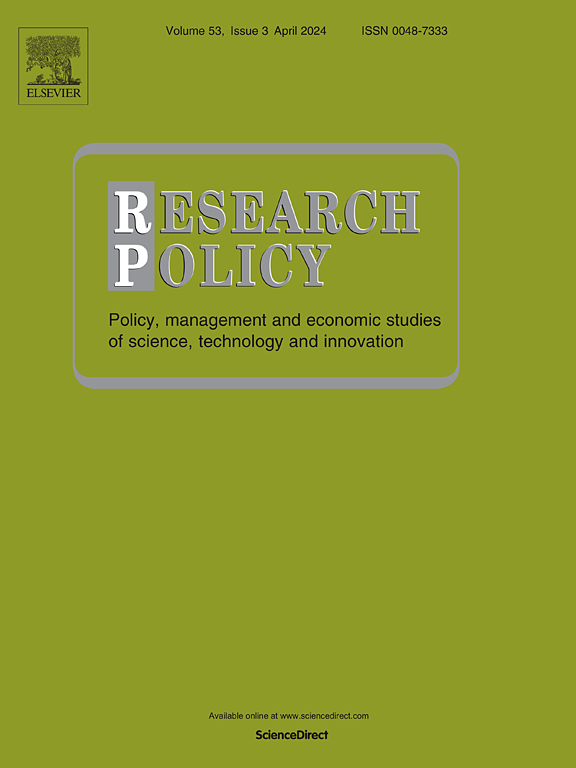Benefits beyond the local network: Does indirect international collaboration ties contribute to research performance for young scientists?
IF 8
1区 管理学
Q1 MANAGEMENT
引用次数: 0
Abstract
This study examines how the research performance of young scientists is influenced by indirect international collaboration ties formed through domestic collaborators with transnational academic connections. Based on a comprehensive dataset of 8,341,013 young scientists worldwide from the Scopus database covering 2000–2020, we employ a variety of methods to confirm that young scientists with a higher density of indirect international collaboration ties achieve significantly greater research productivity and prominence. Facilitating international knowledge spillover and nurturing new collaboration ties beyond local networks are important mechanisms through which indirect international collaboration ties exert positive impacts. Moreover, the positive effect of indirect international collaboration ties is enhanced when young scientists share sufficient cognitive proximity with foreign partners amongst their domestic collaborators. The impact of indirect international collaboration ties also shows significant heterogeneity, with particular benefits observed for natural scientists, males, and scientists from underdeveloped countries. These results underscore that transnational academic connections held by domestic collaborators constitute a vital form of academic social capital, facilitating the integration of young scientists into global academic networks and consequently enhancing their research performance.
超越本地网络的好处:间接的国际合作关系对年轻科学家的研究绩效有贡献吗?
本研究考察了具有跨国学术关系的国内合作者所形成的间接国际合作关系如何影响青年科学家的研究绩效。基于Scopus数据库2000-2020年全球8,341,013名青年科学家的综合数据,我们采用多种方法证实,间接国际合作关系密度较高的青年科学家的研究生产力和知名度显著提高。促进国际知识溢出和培育超越本地网络的新型合作关系是间接国际合作关系发挥积极作用的重要机制。此外,当年轻科学家在其国内合作者中与外国合作伙伴共享足够的认知接近度时,间接国际合作关系的积极效应得到增强。间接国际合作关系的影响也显示出显著的异质性,对自然科学家、男性和来自不发达国家的科学家有特别的好处。这些结果强调,国内合作者拥有的跨国学术联系构成了学术社会资本的重要形式,促进了青年科学家融入全球学术网络,从而提高了他们的研究绩效。
本文章由计算机程序翻译,如有差异,请以英文原文为准。
求助全文
约1分钟内获得全文
求助全文
来源期刊

Research Policy
MANAGEMENT-
CiteScore
12.80
自引率
6.90%
发文量
182
期刊介绍:
Research Policy (RP) articles explore the interaction between innovation, technology, or research, and economic, social, political, and organizational processes, both empirically and theoretically. All RP papers are expected to provide insights with implications for policy or management.
Research Policy (RP) is a multidisciplinary journal focused on analyzing, understanding, and effectively addressing the challenges posed by innovation, technology, R&D, and science. This includes activities related to knowledge creation, diffusion, acquisition, and exploitation in the form of new or improved products, processes, or services, across economic, policy, management, organizational, and environmental dimensions.
 求助内容:
求助内容: 应助结果提醒方式:
应助结果提醒方式:


